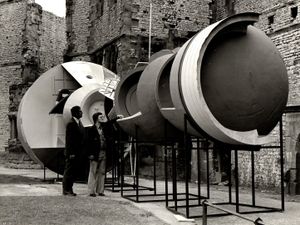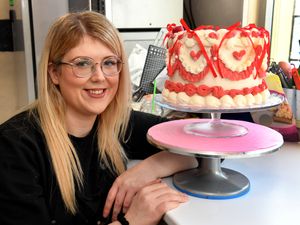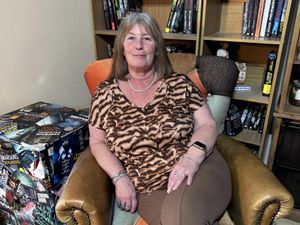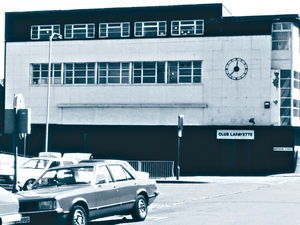Tim Peake brings his space travel stories to the West Midlands and Staffordshire
British astronaut Tim Peake is keeping his feet firmly on the ground for the time being as his one-man show My Journey To Space goes back on the road.
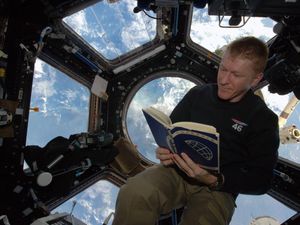
Tim made history in 2015 as the first British astronaut to visit the International Space Station, where he spent six months living and working in space.
And now fans in the West Midlands can take orbit with Tim, as he shares the secrets and science of how and why humans journey into space.
My Journey To Space gives audiences a fascinating insight into life as an astronaut, complete with breath-taking photographs and never-before-seen footage.
Tim Peake joined the European Space Agency in 2009, after an 18-year career in the Army. In December 2015, he became the first British astronaut to visit the International Space Station and to conduct a spacewalk while orbiting Earth.
He's thrilled to be able to share his experiences with fans during his theatre tour. "It’s been brilliant actually. We started in October 2021, so for a lot of people it was their first time getting out and about since lockdown, and then we did more dates in March 2022. We were pretty much sold out everywhere – which was fantastic.
"I’ve done lots of speaking since joining the ESA, in schools and colleges and in corporate environments, but this was my first time doing something like this and it’s quite a different experience. This is a ‘show’, being on stage for 90 minutes and that means a lot of material… And it was packed with stuff. I had to get into a different mindset to give the audience a truly immersive experience of what it’s like to be in space.
"I was very conscious that people had taken the time and effort to come and see me for an evening. For some it might have been a special birthday or Christmas gift. That was very humbling and an honour, so I wanted to give the audience a show to remember."
Tim's show focuses on his journey to space and allows him to embellish on some of the stories in his book, Limitless. "It takes you through how I got to be where I am, doing what I do, and what it takes to become an astronaut. I’ve enjoyed an incredible journey – from military test flying and combat mission to living in caves and training for days underwater.
"The show aims to answer all your questions about living and working in space. There’s a very beautiful section which takes the audience on an orbit round earth, looking down on the planet and then a high-adrenaline insight into spacewalking.
"It’s the closest we can get to actually taking people into space.
"There are a lot of audio-visual elements to it, and the feedback so far has been brilliant. People say they learn a lot from coming along – whether they were already knowledgeable about space and my story or not, they’ve gotten new insights. Some of the best responses have been the people who came along to accompany a friend or partner, and they’ve had a fantastic time.
"You don’t have to be into space to enjoy it, you don’t need any prior knowledge or anything, it’s just a great experience. It’s uplifting, motivational, inspiring and funny. From eight-year-olds to 80-year-olds, it’s very much accessible for all age groups."
His journey to space began during his18-year military flying career, where he spent time in the US, in Bosnia and Afghanistan. He worked as a test pilot, pushing aircraft to their very limits.
"It was an interesting journey really and, to be honest, I sometimes felt like a fraud alongside some of my ESA colleagues… They were those kids at four or five years old, saying ‘I want to be an astronaut’. I wasn’t that child. I wanted to be a pilot, my passion was always flying – and that’s what I did.
"Growing up in the 80s, I didn’t – couldn’t – think that coming from the UK there was an opportunity to become an astronaut. No one here was thinking of that in the 80s, it was something that seemed to only be available to Russians and Americans.
"I left school with three below-average A Levels, and joined the Army where I was lucky enough to be able to learn how to fly. And I was relentless in my career, always learning, trying to improve myself. I never stopped studying. As a test pilot, I realised I needed to raise my game academically and eventually got a degree in my early 30s.
"For me, hard work, endurance and perseverance were key – and because of that I was able to grasp an opportunity when it arose."
The European Space Agency chose him from more than 8,000 applicants across Europe, which was mind-blowing.
"Getting to the point of being invited to join the European Space Agency was an absolute rollercoaster of emotions.
Just the very fact that we, as UK residents, could potentially join the ESA, the fact that we could even apply to the programme was something of great excitement to people like me.
"At the time, I was working as a test pilot and there was a huge buzz among my friends and colleagues. Thousands of people applied the very first time applications opened – and out of 8,413 only around 800 or 900 were accepted through the first round – so I was very lucky to even make that cut.
"For me, I knew that was going to be the toughest round. I knew I came from a less academic background… Yes, I had my degree by then, but some of the people around me had PhDs and were working at CERN. At the first assessments in Hamburg, I remember looking round the room at the amazing company I was in, but I knew if I could pass that round then I was in with a chance.
"When we got down to the final 10, with just four places available, the director general of ESA wanted to meet all of us – and he then decided he was going to actually select six people. Even then, I didn’t quite believe I’d make the final cut as at that time, the UK wasn’t paying into the human spaceflight programme, so why would they chose a UK candidate?
"The announcement was planned for a Wednesday, and I got a phone call on the Monday evening – by which time, I’d assumed it was a ‘Thanks but no thanks’ call. Instead, they were asking me to get to Paris, ready for the announcement.
"I wanted to keep it a secret to myself, but my wife caught on to the call as I couldn’t hide my excitement. I was allowed to tell my immediate family. It was a big shift for us as we were preparing to leave the Army; we were all set to move to Yeovil for a civilian job as a test pilot – and all of a sudden, the plan changed and we were moving to Cologne.
"Sometimes you just have to grab an opportunity when you have the chance."
Tim says the launch into space is extraordinary: "There’s one word; phenomenal.
"You do all the training, going into centrifuge to experience the G forces, all of that. But nothing can prepare you for the blast of a rocket propelling you to 25-times the speed of sound.
"During the first stage, you’re very aware of the power because of all the noise and vibration and G force. It’s full on. But as you reach space, the rocket levels out and becomes horizontal. There’s no drag, nothing slowing you down, and yet this rocket is still creating four Gs of acceleration…The feeling of speed is overwhelming. That is the point when you really know you are entering another realm.
"It’s a very violent experience, in terms of energy. Then, when the engine cuts out, weightlessness kicks in, and you’re looking down on to a beautiful planet, and it is eerily quiet.
"It’s very other worldly. It takes a while to be able to process just where you are and what you’re doing. It was an incredibly special experience. Luckily, you then get six months to really contemplate it…"
His tour will reach Birmingham Symphony Hall on September 7. The tour will also take in Stoke-on-Trent's Victoria Hall on September 29.


